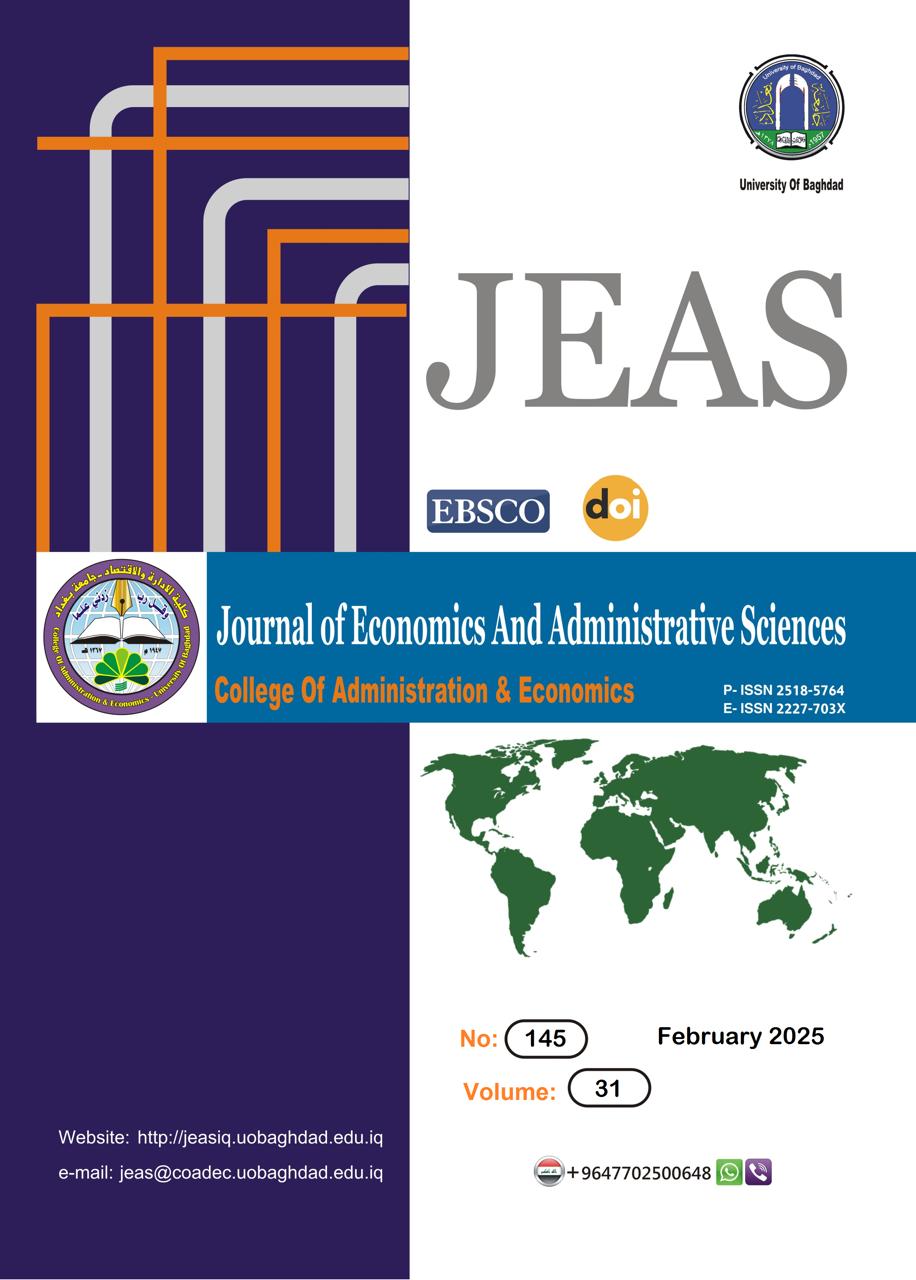Strategic Leadership and Their Impact on the Quality of Work Life: An Analytical Study in the Directorate of Intelligence and Counter-Terrorism
DOI:
https://doi.org/10.33095/pcg53m11Keywords:
Strategic Leadership (SL), Quality of Work Life (QWL), Intelligence and CounterTerrorism Directorate, Human Capital Development (DHC), Ethical Practices (EEP),Job SecurityAbstract
The present study investigates the linkage between strategic leadership practices and quality of work life (QWL) within the Intelligence and Counter-Terrorism Directorate. Data was drawn from 115 freshly acquired respondents from senior and middle management by means of a multi-item questionnaire. The analysis that follows - SPSS, AMOS and SMART PLS V.4 - shows that the Directorate's clear defining of strategic direction and decisive decision making largely affects QWL. The study deduces critical issues pertaining to strategic leadership towards the improvement of work conditions and job security and human capital development where all will lead to better performance by the organization. In summary, strategic leadership practices, including setting strategic direction, developing human capital, ethical practices, and balanced strategic control, significantly affect quality of work life. The Directorate is very much interested in a clear definition of direction with respect to the strategic direction resulting from its decisive and bold decision-making at several points of the organization and with its transparent task descriptions. The Directorate also shows increasing importance toward emphasizing ethical practices by backing its levels with some ethical standards and principles and proper use of scarce resources in tandem with the Directorate approach towards further showing interest in the constitutionality of how the work is arranged, dealing equally with workers, and providing job security based on efficiency and productivity. This study, therefore, emphasizes the relevance of strategic leadership with respect to the positive creation of an atmosphere within which to improve organizational performance through better quality of work life.
Downloads
References
Abebe, A., & Assemie, A. (2023). QWL and organizational commitment of the academic staff in Ethiopian universities. Heliyon, 9(4).
Aboudahr, S. M. F. M. (2021). SL as a mediating variable between organizational climate and quality improvement in higher education. Journal of Southwest Jiaotong University, 56(2).
Ahmed, G. , & Al Amiri, N. (2019). An analysis of SL effectiveness of Prophet Muhammad (PBUH) based on Dave Ulrich Leadership Code. Journal of Islamic Studies and Culture, 7(1), 11–27.
Alayoubi, M. M., Al Shobaki, M. J., & Abu-Naser, S. S. (2020). SL practices and their relationship to improving the quality of educational service in Palestinian Universities. International Journal of Business Marketing and Management (IJBMM), 5(3), 11–26.
Al Thani, F. B. H., & Obeidat, A. M. (2020). The impact of SL on crisis management. International Journal of Asian Social Science, 10(6), 307–326.
Andersz, N., Czarnota-Bojarska, J., & Wojtkowska, K. (2018). Strategies for maintaining work–life balance and their consequences for quality of life and job satisfaction. Social Psychological Bulletin, 13(2), 1–13.
Arijaldi, A. (2020). The Role Of SL And Work Life Quality On Improving Work Productivity. Indonesian Journal of Strategic Management, 3(1).
Asif, A., & Basit, A. (2021). Exploring SL in organizations: a literature review. Governance and Management Review, 5(2).
Astuti, J. P., & Soliha, E. (2021). The effect of QWL and organizational commitment on performance with moderation of organizational culture: study on public health center puskesmas in gabus district. International Journal of Social and Management Studies, 2(6), 89–99.
Awad, M. J., Saeed, M. M., & Hamid, M. Q. (2021). The Impact of the SL in Strategic Learning Exploratory Research at Anbar University. Journal of Economics and Administrative Sciences, 27(128), 99–112.
Banmore, O. O., Adebayo, L., Mudashiru, M., Oluwatooyin, G., Falilat, A., & Olufunke, O. (2019). Effect of SL on competitive advantage of selected quoted insurance companies in Nigeria. The Journal of Accounting and Management, 9(2), 70–78.
Bhatt, H. C. (2018). Leadership styles and QWL in small and medium scale enterprises of kumoun region of uttarakhand. Journal of Strategic Human Resource Management Volume, 7(1).
Bhende, P., Mekoth, N., Ingalhalli, V., & Reddy, Y. V. (2020). QWL and work–life balance. Journal of Human Values, 26(3), 256–265.
Cortes, A. F., & Herrmann, P. (2021). SL of innovation: a framework for future research. International Journal of Management Reviews, 23(2), 224–243.
Dahri, A. S., Amin, S., & Waseem, M. (2019). Effect of SL on Organizational Performance through Knowledge Management. Journal of Managerial Sciences, 13(2).
Daniel, C. O. (2019). Analysis of quality work life on employees performance. International Journal of Business and Management Invention (IJBMI), 8(2), 60–65.
Efendy, H. (2018). Implementation of Human Capital Management in HR Section of the Hang Tuah School of Health Science (STIKES) Pekanbaru . International Journal of Human Resource Studies, 8(1), 17–37.
Gurdogan, E. P., & Uslusoy, E. C. (2019). The relationship between QWL and happiness in nurses: A sample from Turkey. International Journal of Caring Sciences, 12(3), 1364–1371.
Hasan, A. A., Kadhem, H. F., & Jawad, A. B. (2023). The Role of QWL in Reinforcing Core Competencies: A Descriptive and analytical research in the Ministry of Health. Journal of Economics and Administrative Sciences, 29(138), 67–78.
Jaleha, A. A., & Machuki, V. N. (2018). SL and organizational performance: A critical review of literature. European Scientific Journal, 14(35), 124–149.
Kerubo, L., Kerubo, N. R., & Muturi, W. (2019). Influence of SL Practices on Organizational Performance; A Case Study of Tea Factories in Kisii County. Global Journal of Management And Business Research.
Kitonga, D. (2017). SL practices and organizational performance in not-for-profit organizations in Nairobi county in Kenya. Unpublished Doctoral Dissertation, Jomo Kenyatta University of Agriculture and Technology, Kenya.
Moda, H. M., Nwadike, C., Danjin, M., Fatoye, F., Mbada, C. E., Smail, L., & Doka, P. J. S. (2021). QWL QWL and perceived workplace commitment among seasonal farmers in Nigeria. Agriculture, 11(2), 103.
Nahak, M., & Ellitan, L. (2022). The role of SL in supporting strategic planning and increasing organizational competitiveness. International Journal of Trend in Scientific Research and Development (IJTSRD), 6(3), 1441–1444.
Naja, W. A. R., & ungku Ahmad, U. N. (2024). The Impact Of Sl Styles On Financial Performance In Libyan Oil And Gas Industry. Journal of Law and Sustainable Development, 12(2), e3302–e3302.
Nanjundeswaraswamy, T. (2015). Leadership styles and QWL in SMEs. Management Science Letters, 5(1), 65–78.
Noor, J. (2015). The Factors of SL on Commitment: An Empirical Banking in Indonesia. International Research Journal of Business Studies, 6(3).
O’Shannassy, T. (2021). The challenges of SL in organizations. Journal of Management & Organization, 27(2), 235–238.
Parra Castrillón, J. E. (2024). Barriers to SD in community-based social organizations. Tendencias, 25(2), 1–25.
Perangin-Angin, M. R., Lumbanraja, P., & Absah, Y. (2020). The effect of QWL and work engagement to employee performance with job satisfaction as an intervening variable in PT. Mopoly Raya Medan.
Raoof, . L, Q. (2020). The role of organizational symmetry in improving the QWL an applied research at the University of Information and Communications Technology. Journal of Economics and Administrative Sciences, 26(121), 301–316.
Sabonete, S. A., Lopes, H. S. C., Rosado, D. P., & Reis, J. C. G. dos. (2021). QWL according to Walton’s model: Case study of the higher institute of defense studies of Mozambique. Social Sciences, 10(7), 244.
Sajida, P. W., & Moeljadi, M. (2022). The effect of SL and role conflict to employee’s commitments with work stress as mediation. Jurnal Aplikasi Manajemen, 16(3), 440–447.
Singh, A., Lim, W. M., Jha, S., Kumar, S., & Ciasullo, M. V. (2023). The state of the art of SL. Journal of Business Research, 158, 113676.
Tao, Y. , He, J. , Wang, Y. F. , & Ke, H. (2021). SL: A Bibliometric Analysis on Current Status and Emerging Trends. International Journal of Organizational Leadership, 10(4), 439–458.
Tuasikal, H., Perwana, D., & Suhud, U. (2022). Leadership, QWL and Self Development in Increasing Work Engagement for Polytechnic Lecturers LP3I Jakarta. Journal Research of Social Science, Economics, and Management, 1(7), 910–921.
Ucar, R., & Dalgic, S. (2021). Relationship between School Principals’ SL Characteristics and School Teachers’ Organizational Commitment Levels. Eurasian Journal of Educational Research, 91, 105–126.
Wakhisi, W. (2021). Effect of SL on organization performance of state-owned sugar manufacturing firms in western kenya. International Journal for Innovation Education and Research, 9(9), 1–55.
Yas, H., Alkaabi, A., ALBaloushi, N. A., Al Adeedi, A., & Streimikiene, D. (2023). The impact of SL practices and knowledge sharing on employee’s performance. Polish Journal of Management Studies, 27.
Published
Issue
Section
License
Copyright (c) 2025 Journal of Economics and Administrative Sciences

This work is licensed under a Creative Commons Attribution-NonCommercial-NoDerivatives 4.0 International License.
Articles submitted to the journal should not have been published before in their current or substantially similar form or be under consideration for publication with another journal. Please see JEAS originality guidelines for details. Use this in conjunction with the points below about references, before submission i.e. always attribute clearly using either indented text or quote marks as well as making use of the preferred Harvard style of formatting. Authors submitting articles for publication warrant that the work is not an infringement of any existing copyright and will indemnify the publisher against any breach of such warranty. For ease of dissemination and to ensure proper policing of use, papers and contributions become the legal copyright of the publisher unless otherwise agreed.
The editor may make use of Turtitin software for checking the originality of submissions received.


























